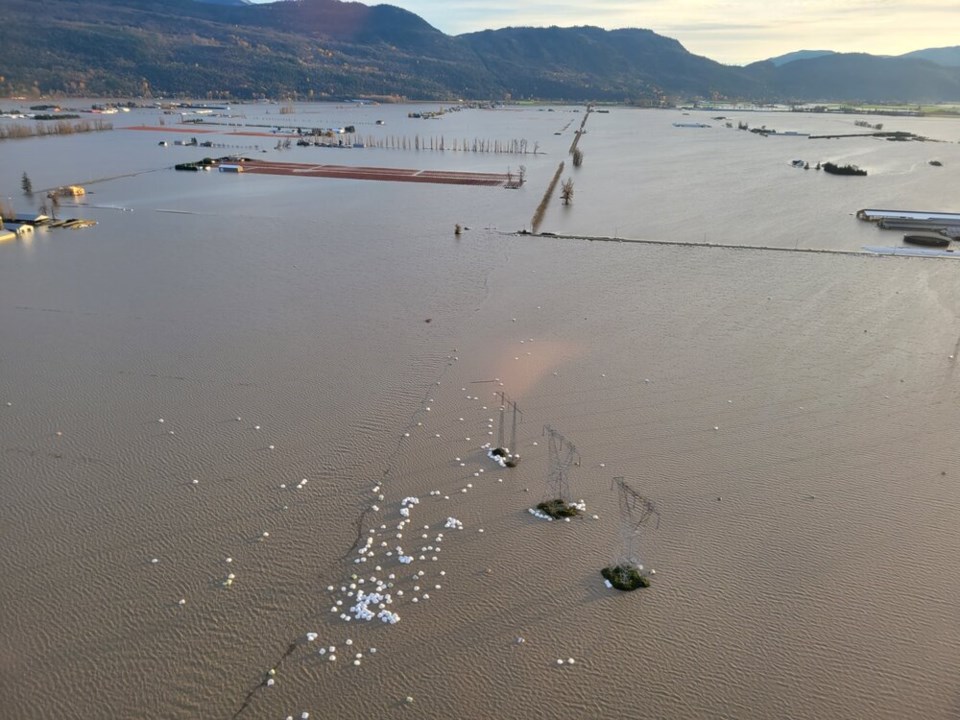As floodwaters rose in Abbotsford Tuesday, 18-year-old Dylan Putz’s way to cancer treatment in Â鶹´«Ă˝Ół»seemed to wash away along with swaths of Highway 1.
The avid mountain biker and trainee electrician was diagnosed with rhabdomyosarcoma, a rare and aggressive cancer in September 2020. He has been making the nearly two-hour car trip from east Chilliwack to BC Children’s Hospital in Â鶹´«Ă˝Ół»at least once a week for more than a year.
But when the highway washed out in floods and mudslides near Abbotsford and Hope, cutting off Chilliwack and Hope from the rest of the province, his appointment to place a stomach drain on Thursday and plans to begin a new round of chemotherapy were jeopardized.
“You don’t want to put things off… especially when having cancer treatment, any delay feels scary,” said Dylan’s mom, Carmen Putz in an interview on Thursday as Dylan recovered in hospital.
Dylan and his father, Brian Putz, were able to get on a helicopter chartered by Brian’s employer over the floods to Abbotsford, where the construction company also arranged a truck for them to drive into Vancouver.
While he made it, the younger Putz is one of likely hundreds of patients in Chilliwack and Hope areas who are scrambling to find a way to essential health care only accessible in Abbotsford and Â鶹´«Ă˝Ół»amid record flooding, evacuations and closures of highways 1 and 7.
According to the most recent data available, in 2012 more than 720 people in Chilliwack and Hope are diagnosed with cancer each year, a number which has likely increased as better screening practices increase cancer diagnosis rates across B.C.
Dozens of comments from Fraser Valley residents on a Chilliwack Facebook group describe cancer and dialysis patients being stranded in Abbotsford away from home and their regular medications, or stuck behind the floodline without a plan to reach timely care for a variety of chronic and urgent conditions.
Fraser Health has been arranging flights for patients between Chilliwack and Abbotsford, Carmen said, but many Fraser Valley residents being treated in Â鶹´«Ă˝Ół»are not even on their radar. (Cancer care is co-ordinated by the Provincial Health Services Authority and the vast majority of it is delivered in Vancouver.)
Neither she nor Gabrielle Kristzl Toth were contacted about getting to Â鶹´«Ă˝Ół»for care, despite private charters leaving from Chilliwack airport for patients cared for under the Fraser Health authority.
“We’re basically with Â鶹´«Ă˝Ół»Coastal Health, so Fraser Health doesn’t even know about us,” said Toth in an interview.
Toth’s husband Chuck Toth was diagnosed with pancreatic cancer in August and is slated for surgery to remove the cancer on Monday.
But she doesn’t know how they will get there and is preparing to show up along the recently opened Highway 7 lane for commercial and essential vehicles to argue their way through.
Chuck’s surgery has already been delayed once due to pandemic-related staffing shortages at Â鶹´«Ă˝Ół»General Hospital, said Toth, “and this is a cancer patient, so time is of the essence.”
The stress is compounded by having to sort out care for the couple’s two dogs and pay for a hotel in Â鶹´«Ă˝Ół»for a longer period because she can’t go back and forth.
“It’s scramble time,” said Toth. “You’re already under such extreme stress when somebody in the family has cancer. So this is just really not easy to deal with.”
The flooding has also disrupted a number of patients who travel from Chilliwack to Abbotsford for dialysis and other cancer care.
Fraser Health confirmed it is co-ordinating some emergency transportation for patients trapped by highway closures between Chilliwack and Abbotsford.
“Fraser Health has been in contact with all affected dialysis patients and is assisting a small number of Chilliwack residents who require access to dialysis services at the Abbotsford Community Dialysis Unit or Abbotsford Regional Hospital,” said a spokesperson in a followup email.
“We are co-ordinating air transportation and accommodations, if necessary, for these individuals.”
The Provincial Health Services Authority said about 70 patient appointments at BC Cancer Abbotsford have been cancelled or delayed due to the floods in the last three days, but the vast majority of its more than 400 daily appointments have continued.
The health authority is prioritizing urgent care and said cancer patients are considered essential travellers for access to the single lane of Highway 7 that recently reopened.
“Where needed, BC Cancer is exploring all transport options for our patients, taking it on a case-by-case basis, as our priority is to ensure patients have access to the timely care they need,” wrote a spokesperson to The Tyee.
The Ministry of Health said in a statement that cancer-care facilities in Abbotsford and Â鶹´«Ă˝Ół»have not been affected by the flooding but that patients without transportation to their appointments should reach out to their cancer centre for help arranging transport and accommodations.
For Toth, it underscores the need to invest in specialized health services in Chilliwack itself, and not just rely on people travelling to Â鶹´«Ă˝Ół»for essential care.
She and Charles moved to Chilliwack from Surrey near the beginning of the pandemic after he retired from being a bus driver in Â鶹´«Ă˝Ół»but have commuted to Â鶹´«Ă˝Ół»for all his tests and screenings because wait times in Chilliwack for a simple CT scan were up to six weeks.
Toth hopes this is a wake-up call for further investments in specialized care in Chilliwack and Hope.
“The real specialists are in Vancouver,” she said. “So when your access is cut off from that hub, you’re basically at their mercy.”





